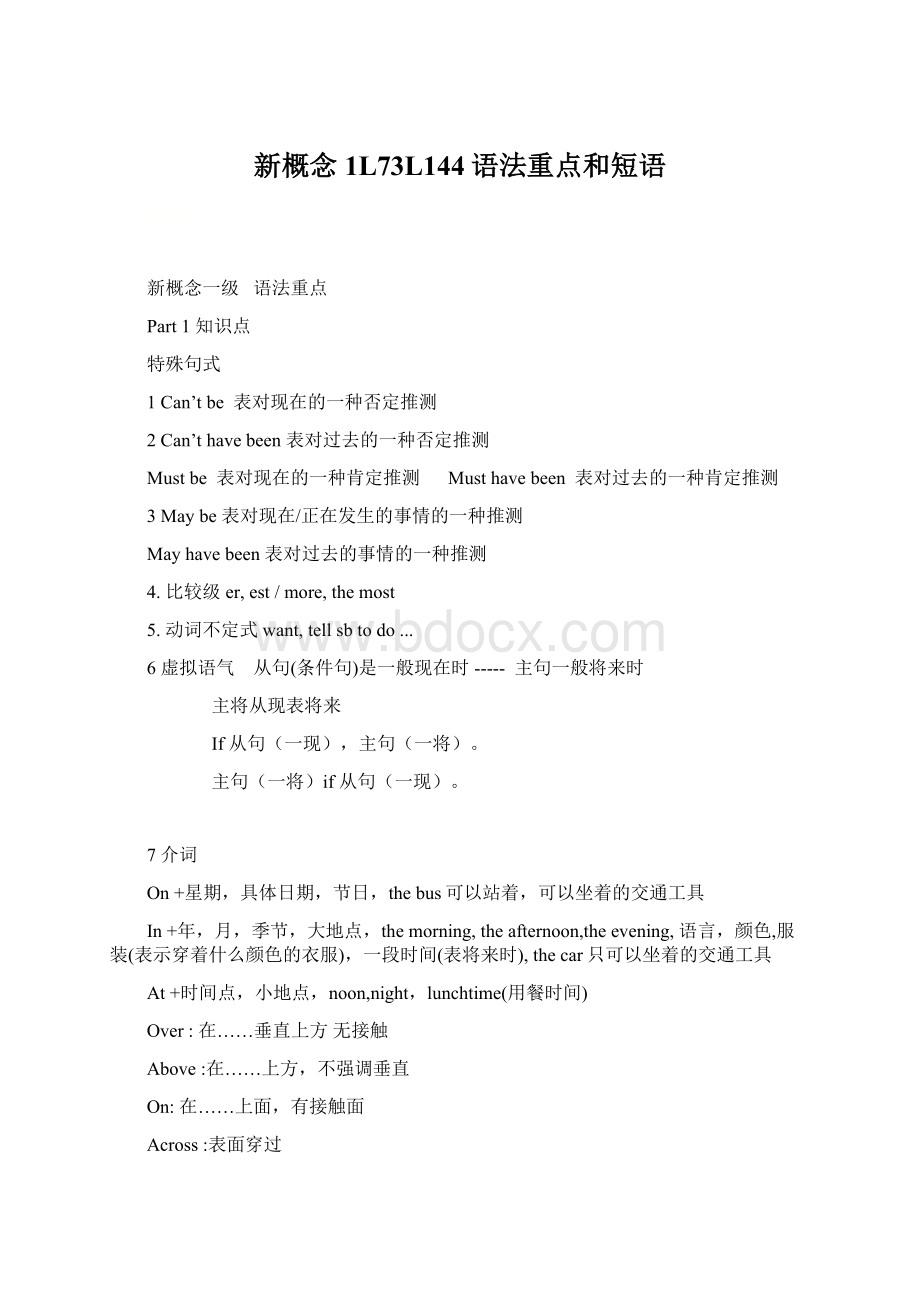新概念1L73L144语法重点和短语.docx
《新概念1L73L144语法重点和短语.docx》由会员分享,可在线阅读,更多相关《新概念1L73L144语法重点和短语.docx(16页珍藏版)》请在冰豆网上搜索。

新概念1L73L144语法重点和短语
新概念一级 语法重点
Part1 知识点
特殊句式
1 Can’tbe 表对现在的一种否定推测
2 Can’thavebeen 表对过去的一种否定推测
Mustbe 表对现在的一种肯定推测 Musthavebeen 表对过去的一种肯定推测
3 Maybe 表对现在/正在发生的事情的一种推测
Mayhavebeen 表对过去的事情的一种推测
4.比较级er,est/more,themost
5.动词不定式want,tellsbtodo...
6 虚拟语气 从句(条件句)是一般现在时 ----- 主句一般将来时
主将从现表将来
If 从句(一现),主句(一将)。
主句(一将)if 从句(一现)。
7 介词
On+星期,具体日期,节日,the bus可以站着,可以坐着的交通工具
In+年,月,季节,大地点,themorning,theafternoon,theevening, 语言,颜色,服装(表示穿着什么颜色的衣服),一段时间(表将来时),the car只可以坐着的交通工具
At+时间点,小地点,noon,night,lunchtime(用餐时间)
Over:
在……垂直上方 无接触
Above:
在……上方,不强调垂直
On:
在……上面,有接触面
Across:
表面穿过
Through:
表内部穿过
Under:
在……正下方
Below:
在……下方
Except:
除……之外 (从一个整体中除去其中一部分)
Besides:
除……之外 (从两个整体中除去其中一个整体)
Inthe 方向 (一个整体中一个在另一个的。
。
方向)eg. 东北在中国的北方。
In 方向 (两个整体中一个在另一个的。
。
。
方向)eg. 韩国在中国的东方。
8 形容词及副词
口诀:
形修名,副修动副形
形容词+ly=副词
1, 直接+ly
2, 以辅音+y结尾,去y变i+ly
3, 本身就是副词:
hard,early,fast,high,long,late,very,well,….
4, 有ly但不是副词是形容词:
manly,lovely,friendly….
9 关于“也”
too 放于肯定句尾
也 either 放于否定句尾
also 放于句中
10 关于 “leave”
leave+地点 (出发地) eg。
火车7点离开北京。
Thetrainleaves Beijing at7:
00.
leavefor+地点 (目的地) eg. 火车7点离开这去北京.ThetrainleavesforBeijngat7:
00.
11 关于 “花费”
1. 物 costsb. 钱。
2. 人 spend 时/钱 onsth.
人 spend 时/钱 indoingsth.
3. 人 pay 钱 forsth.
12 关于“太,足够的”
too+ 形容词 (对说话人没有好处的)
very+ 形容词 (对说话人有好处的)
形容词 +enough+ 名词
13 关于 “不定代词”
notany=no
notanyone=noone
notanything=nothing
notanywhere=nowhere
notanybody=nobody
14 关于“定语从句”
人(主语,宾语) who + 从句
人 (宾语) whom+ 从句
事物,动物 which+ 从句
万能(可以替代以上三个)that+ 从句
地点 where+ 从句
15 关于“感叹句”
1, Whata/an 形容词 名词(c.单数)!
What 形容词 u. !
2, How 形容词 主语 be!
16 关于“情态动词”
提问词 肯定回答 否定回答
Have have haven’t
Must must needn’t/don’thaveto
Need need needn’t
May may mustn’t
17 关于“动词”
Think,believe 等表达主观思想的动词后面要+ 宾语从句。
否定形式要把 don’t 放在动
词前面。
Eg. 我认为我能吃5个苹果。
IthinkIcaneat5apples.
我认为我吃不了5个苹果。
Idon’tthinkIcaneat5apples.
18 关于“引导词”
主语+动词+特殊疑问引导词(if是否/why为什么/what什么/when什么时候…)+宾语从句.
19 关于“被动语态”
1, 一现被:
主语+am/is/are+v.过分 + 名词。
2, 一过被:
主语+was/were+v.过分 + 名词。
3, 一将被:
主语+willbe+v.过分 + 名词。
主语+am/is/aregoingtobe+v.过分 + 名词。
4, 现完被:
主语+have/hasbeen+v. 过分 + 名词。
20 关于“简略句式”
1, So 助动词 主语。
(肯定句)
2, Neither 助动词 主语。
(否定句)
Part2 时态
1, therebe 句型
is + 可数名词单数 / 不可数名词复数
(肯定句)Therebe
are + 可数名词复数
eg. Thereisanapple./Thereis some water.
Thereare some apples.
isnot +可数名词单数 / 不可数名词复数
(否定句)Therebe
arenot+ 可数名词复数
eg. Thereisnotanapple./Thereisnot any water.
Therearenot any apples.
some 用于肯定句
☆ 一些
any 用于否定句 、 疑问句
(一般疑问句) Is thereany + 可数名词单数 / 不可数名词复数
Are + 可数名词复数
eg. Isthereanapple?
/Isthereanywater?
Arethereanyapples?
(特殊疑问句) Howmany 可数名词复数 arethere?
Howmuch 不可数名词单数 isthere?
eg. Howmanyapplesarethere?
Howmuchwateristhere?
2,现在进行时 (now,look,listen,atthismoment……)
(肯定句) 八个主语 +be(am/is/are)+V.ing.
eg. Iamplaying. / Heisplaying. / Theyareplaying.
(否定句) 八个主语 +benot(amnot/isnot/arenot)+V.ing.
eg. Iamnotplaying./Heisnotplaying./Theyarenotplaying.
☆ amnot=ain’t isnot=isn’t arenot=aren’t
(一般疑问句) Be+ 八个主语 +V.ing?
eg. Areyouplaying?
/ Isheplaying?
/Aretheyplaying?
(特殊疑问句) 把W、H开头的特殊疑问词放在句首
What/Where/…+be+ 主语 +doing?
eg. Whatareyoudoing?
/ Howisheplaying?
/Wherearetheyplaying?
3,一般将来时(tomorrow,next…,soon,inafewminutes,will,shall,begoingto,thedayaftertomorrow……)
(肯定句) 八个主语 + will +V.原形
be(am/is/are)goingto
eg. Iwillseeafilm. / Hewillseeafilm. / Theyareseeafilm.
Iamgoingtoseeafilm. /Heisgoingtoseeafilm./Theyaregoingtoseeafilm.
(否定句) 八个主语 +willnot (won’t) +V.原形
benot(amnot/isnot/arenot)goingto
eg. Iwillnotseeafilm./Hewillnotseeafilm. / Theyarenotseeafilm.
Iamnotgoingtoseeafilm. / Heisnotgoingtoseeafilm. /Theyarenotgoingtoseeafilm.
(一般疑问句) Will + 八个主语 +V.原形?
Be + 八个主语 goingto +V.原形?
Shall + I/We +V.原形?
eg. Willyouseeafilm?
/ Willheseeafilm?
/ShallIseeafilm?
Areyougoingtoseeafilm?
/Ishegoingtoseeafilm?
/Aretheygoingtoseeafilm?
(特殊疑问句) 把W、H开头的特殊疑问词放在句首
Whatwill +主语 +do?
be goingto
eg. Whatwillyoudo?
/ Whenwillhedo?
/ Wherewilltheygo?
Whatareyougoingtodo?
/Howishegoingtodo?
4,一般现在时(every…,often,usually,sometimes,always……)
(肯定句) 主语(I/you/we/they)+V.原形. eg. I play.
主语(he/she/it/名称)+V.三单. eg. He plays.
(否定句) 把don’t/doesn’t放在V.前,后面V.用原形。
主语(I/you/we/they)don’t+V.原形. eg. Idon’tplay.
主语(he/she/it/名称)+doesn’t+V.原形. eg. Hedoesn’tplay.
(一般疑问句) 把Do/Does放在句首,后面V.用原形。
Do+ 主语(I/you/we/they)+V.原形 ?
eg.Doyouplay?
Does+ 主语(he/she/it/名称)+V.原形?
eg. Does heplay?
(特殊疑问句) 把W、H开头的特殊疑问词放在句首
What+do+ 主语(I/you/we/they)+do?
eg. Whatdoyoudo?
Where+does+ 主语(he/she/it/名称)+V.原形?
eg. Wheredoesheplay?
5,一般过去时(last…,yesterday,ago,thedaybeforeyesterday,in1999,justnow,attheageof10,onceuponatime……)
(肯定句) 八个主语 +V.过去式.
eg. I played. / He played.
(否定句) 把didn’t放在V.前,后面V.用原形。
主语 +didn’t+V.原形.
eg. Ididn’tplay./Hedidn’tplay.
(一般疑问句) 把Did放在句首,后面V.用原形。
Did+ 主语 +V.原形?
eg. Didyouplay?
/ Didheplay?
(特殊疑问句) 把W、H开头的特殊疑问词放在句首
What+did+ 主语 +do?
eg. Whatdidyoudo?
/ Whendidheplay?
6,过去进行时(atthatmoment,atthattime,when,while,as+从句……)
(肯定句) 八个主语 +be(was/were)+V.ing.
eg. Iwasplaying. / Hewasplaying. / Theywereplaying.
(否定句) 八个主语 +benot(wasnot/werenot)+V.ing.
eg. Iwasnotplaying./Hewasnotplaying./Theywerenotplaying.
☆ wasnot=wasn’t werenot=weren’t
(一般疑问句) Be+ 八个主语 +V.ing?
eg. Wereyouplaying?
/ Washeplaying?
/Weretheyplaying?
(特殊疑问句) 把W、H开头的特殊疑问词放在句首
What/Where/…+be+ 主语 +doing?
eg. Whatwereyoudoing?
/ Howwasheplaying?
/Whereweretheyplaying?
7,现在完成时(for+一段时间,since+ 时间点,already表肯定,yet表否定,sofar,uptill……)
(肯定句) 主语(I/you/we/they)+have+V.过分. eg. I have played.
主语(he/she/it/名称)+has+V.过分. eg. He has played.
(否定句) 把haven’t/hasn’t放在V.前,后面V.仍用过分。
主语(I/you/we/they)haven’t+V.过分. eg. Ihaven’tplayed.
主语(he/she/it/名称)+hasn’t+V.过分. eg. Hehasn’tplayed.
(一般疑问句) 把Have/Has放在句首,后面V.用过分?
Have+ 主语(I/you/we/they)+V.过分?
eg.Haveyouplayed?
Has+ 主语(he/she/it/名称)+V.过分?
eg. Has heplayed?
(特殊疑问句) 把W、H开头的特殊疑问词放在句首
What+have+ 主语(I/you/we/they)+done?
eg.Whathaveyoudone?
Where+has+ 主语(he/she/it/名称)+V.过分?
eg. Wherehasheplayed?
8,过去完成时(时间词同现在完成时……)
(肯定句) 八个主语+had+V.过分. eg. I had played.
(否定句) 把hadn’t 放在V.前,后面V.仍用过分。
八个主语+hadn’t+V.过分. eg. Hehadn’tplayed.
(一般疑问句) 把Had 放在句首,后面V.用过分?
Had+八个主语+V.过分?
eg. Had heplayed?
(特殊疑问句) 把W、H开头的特殊疑问词放在句首
What+had+ 八个主语+done?
eg.Whathadyoudone?
Where+had+ 八个主语 +V.过分?
eg. Wherehadheplayed?
新概念一册lesson73-----lesson144短语固定搭配
lesson73-74
1,lostone’sway迷路
2,asksb.theway问某人路
3,sb.saytooneself自言自语
4,tellsb.theway指路
5,takeout取出,割掉,弄掉……
Lesson75-76
1,be(am/is/are/was/were)infashion正流行的
2,theyearbeforelast前年
Lesson77-78
1,seethedentist/doctor看牙医/医生
2,have/makeanappointment有预约
3,atthemoment=now现在
4,have+病 生…病
Lesson79-80
1,makeashoppinglist写购物清单
2,need当实意动词时:
needtodosth.(有三单变化)
当情态动词时:
needdosth.(无三单变化)
3,not…atall一点…也不,根本不
4,主语+must+goto+商店名+toget+物品。
Lesson81-82
1,have/takeabath洗澡(浴缸)
have/takeashower洗澡(淋浴)
2,have+三餐吃饭
3,have可以替换很多动词
Lesson83-84
1,Excusethemess屋子很乱,请原谅。
2,leave+地点:
从某地出发
leavefor+地点:
要去某地
3,stayat+小地点 待在某地
stayin+大地点 待在某地
Lesson85-86
1,allthetime一直(不停歇)
Lesson87-88
1,bringsth.tosb.把某物带来给某人
bringsb.sth. 把某物带来给某人
2,havealookatsth.=takealookatsth.看一看
3,workon从事于…
4,totellyouthetruth实话告诉你
5,trytodosth.尽力去做某事
trydoingsth.尝试去做某事
Lesson89-90
1,beworthdoingsth.值得做某事
2,havethelastword 最后说了算
3,某物cost某人钱。
某人spend时间/钱onsth.
某人spend时间/钱indoingsth.
某人pay钱forsth.
Lesson91-92
1,moveto+地点 搬去某地
2,moveinto+地点 搬进某地
3,givesb.one’sregards把某人的(one’s)问候带个某人(sb.)
Lesson93-94
1,nextdoorneighbour隔壁邻居
Neighbour邻居
2,flyto地点 飞到某地
Lesson95-96
1,returnticket往返票
2,plentyof+ c. & u.大量的
3,hadbetterdosth.=‘dbetterdosth.最好做某事
hadbetternotdosth.=‘dbetternotdosth.最好不做某事
4,catchthebus=takethebus=bybus=onthebus乘公交车
catchupwith追赶
Lesson97-98
1,theotherday=severaldaysago前几天、
2,sth.Belong(s)tosb.某物属于某人
3,belongtosb.(宾语)=形容词性物主代词
eg.Itbelongstome.=It’smine.
Lesson99-100
1,falloff从…摔下来
falldown摔倒
2,atonce=righ